-
 Bitcoin
Bitcoin $107,380.2492
-0.19% -
 Ethereum
Ethereum $2,496.4194
2.52% -
 Tether USDt
Tether USDt $1.0002
0.01% -
 XRP
XRP $2.2698
3.58% -
 BNB
BNB $658.6709
1.57% -
 Solana
Solana $156.2095
3.14% -
 USDC
USDC $1.0000
0.01% -
 TRON
TRON $0.2795
1.31% -
 Dogecoin
Dogecoin $0.1664
1.40% -
 Cardano
Cardano $0.5812
3.78% -
 Hyperliquid
Hyperliquid $40.8539
6.14% -
 Bitcoin Cash
Bitcoin Cash $513.3617
3.74% -
 Sui
Sui $2.7992
-0.38% -
 Chainlink
Chainlink $13.5045
1.13% -
 UNUS SED LEO
UNUS SED LEO $9.0369
-0.11% -
 Avalanche
Avalanche $18.0365
-0.20% -
 Stellar
Stellar $0.2401
1.74% -
 Toncoin
Toncoin $2.9395
2.20% -
 Shiba Inu
Shiba Inu $0.0...01148
-0.46% -
 Litecoin
Litecoin $86.8907
0.16% -
 Hedera
Hedera $0.1521
2.24% -
 Monero
Monero $320.1315
3.06% -
 Polkadot
Polkadot $3.4232
-0.02% -
 Dai
Dai $0.9999
0.01% -
 Bitget Token
Bitget Token $4.5549
-0.85% -
 Ethena USDe
Ethena USDe $1.0003
0.00% -
 Uniswap
Uniswap $7.2040
0.12% -
 Aave
Aave $277.8968
1.91% -
 Pepe
Pepe $0.0...09854
2.02% -
 Pi
Pi $0.5106
-3.03%
How to export the private key after the Bitcoin wallet address is generated?
Bitcoin private key export depends on your wallet type; hardware wallets prioritize security, often using seed phrases instead of direct key export, while software wallets may offer export but increase risk. Never share your private key.
Mar 14, 2025 at 06:25 am
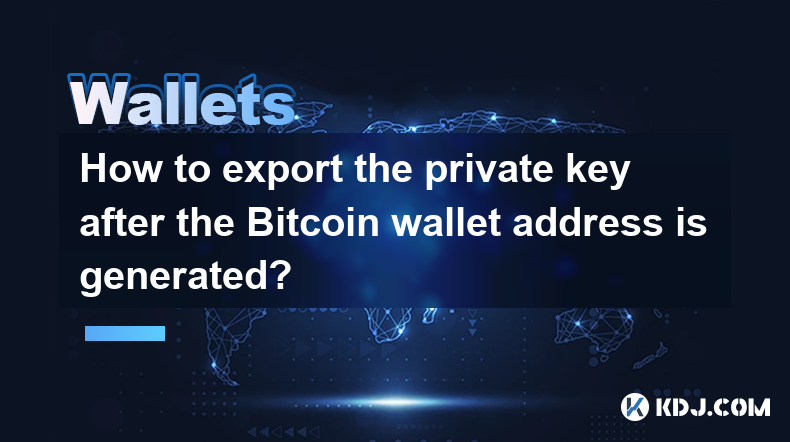
Key Points:
- Bitcoin private keys are not directly exported after address generation. The process depends entirely on the type of wallet used.
- Hardware wallets offer the most secure method of storing private keys, but exporting them requires careful consideration.
- Software wallets provide varying levels of key management, some offering direct export while others derive keys on demand.
- Never share your private key with anyone. Losing your private key means losing access to your Bitcoin.
- Understanding the implications of exporting your private key is crucial before undertaking this process.
How to Export the Private Key After the Bitcoin Wallet Address is Generated?
The question of exporting a Bitcoin private key after generating a wallet address is nuanced and depends entirely on the type of wallet used. There's no universal "export" button. Understanding your wallet type is the first critical step. The method, security implications, and even the possibility of export vary significantly.
Hardware Wallets:
Hardware wallets like Ledger and Trezor are known for their robust security. They don't typically offer a simple "export private key" function. The reason is simple: direct access to your private key is a significant security risk. If your device is compromised, your Bitcoin is at risk. While you can view your seed phrase (a mnemonic phrase used to recover your wallet), this is functionally equivalent to your private key. Treat it with the utmost secrecy.
- Accessing your seed phrase: This is generally done through the wallet's interface, requiring your PIN code. Write it down and store it securely offline.
- Never reveal your seed phrase online or to anyone. This is the single most important security measure.
- Consider multiple layers of security. Physical protection of the device and the written seed phrase are crucial.
Software Wallets:
Software wallets present a different landscape. Some software wallets, particularly those offering full control over keys, may allow direct export of the private key. However, many modern wallets employ methods that don't explicitly show the private key, instead deriving it when needed for transactions.
- Check your wallet's documentation. The method of accessing or exporting the private key (if possible) varies significantly across different software wallets. Some wallets may offer key export options in their advanced settings.
- Understand the risks. Exporting the private key from a software wallet increases the risk of theft or loss. Storing the private key securely is your responsibility.
- Consider using a paper wallet. This involves generating a private key offline and storing it in a secure location. This offers a degree of security, but also has its own risks of loss or damage.
Online Wallets:
Online wallets are generally the least secure option. They typically do not allow direct export of the private key. The wallet provider holds your private keys, making them a single point of failure. While convenient, using an online wallet means you are trusting a third party with your Bitcoin.
Paper Wallets:
Paper wallets are created by generating a Bitcoin address and its corresponding private key offline, then printing them. This is a method of securely storing your keys, provided you maintain physical security of the paper. There is no "export" involved, as the private key is generated and printed directly.
- Use a reputable offline key generator. Avoid online generators due to the risk of malware.
- Store the paper wallet securely. Use a fireproof and waterproof safe.
The Importance of Security:
Regardless of the wallet type, your Bitcoin's security hinges on protecting your private key. Compromising your private key means irreversible loss of your Bitcoin.
Frequently Asked Questions:
Q: Can I recover my Bitcoin if I lose my private key?
A: No, losing your private key means you permanently lose access to your Bitcoin. There is no way to recover it.
Q: Is it safe to export my private key?
A: Exporting your private key increases the risk of theft or loss. It should only be done with extreme caution and only if absolutely necessary.
Q: What is a seed phrase?
A: A seed phrase (or mnemonic phrase) is a list of words that allows you to recover your wallet and access your private keys. Treat it as secret as your private key.
Q: My wallet doesn't have an "export private key" option. What should I do?
A: Many wallets don't explicitly offer a private key export. Check your wallet's documentation for key management options. You might be able to access your seed phrase instead, which allows you to recover your wallet.
Q: What is the safest way to store my Bitcoin?
A: Hardware wallets are generally considered the most secure option for storing Bitcoin. They offer offline protection for your private keys.
Q: Can I transfer my Bitcoin to a new wallet without exporting my private key?
A: Yes. You can transfer Bitcoin using the public address of your new wallet. You don't need to reveal your private key. This is the preferred method for transferring Bitcoin.
Q: What should I do if I suspect my private key has been compromised?
A: Immediately secure your funds by moving your Bitcoin to a new, secure wallet. Change your passwords and implement additional security measures. Consider contacting law enforcement if you believe you've been a victim of theft.
Disclaimer:info@kdj.com
The information provided is not trading advice. kdj.com does not assume any responsibility for any investments made based on the information provided in this article. Cryptocurrencies are highly volatile and it is highly recommended that you invest with caution after thorough research!
If you believe that the content used on this website infringes your copyright, please contact us immediately (info@kdj.com) and we will delete it promptly.
- SUI, TVL, BlockDAG: Navigating the Altcoin Landscape with Strategic Vision
- 2025-07-01 04:30:12
- BlockDAG, Cryptos, 2025 Trends: What's Hot and What's Not
- 2025-07-01 05:10:12
- Avalanche's Reign Challenged: Will Ruvi AI Lead the Next Bull Run?
- 2025-07-01 05:10:12
- Score Big with BetMGM Bonus: MLB, Soccer, and More!
- 2025-07-01 05:15:12
- Solana ETF, Staking Rewards, and Institutional Access: A New Era?
- 2025-07-01 05:50:12
- Filecoin (FIL) Gains Trade Momentum: A New Yorker's Take
- 2025-07-01 06:10:12
Related knowledge
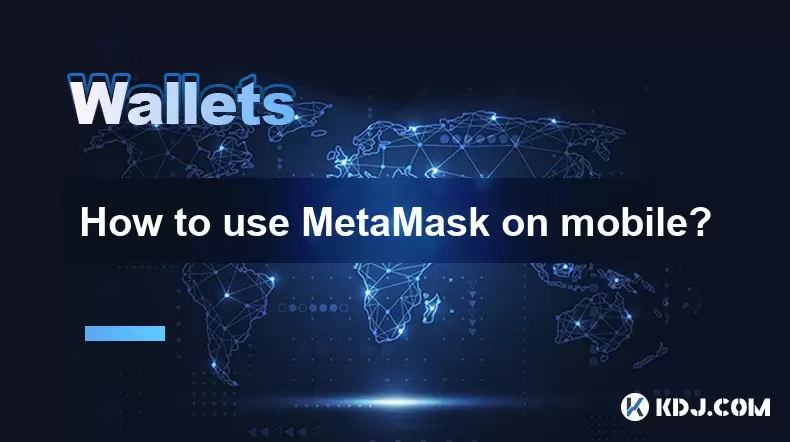
How to use MetaMask on mobile?
Jul 01,2025 at 06:00am
What is MetaMask and Why Use It on Mobile?MetaMask is one of the most widely used cryptocurrency wallets, offering users a secure way to interact with decentralized applications (dApps) on the Ethereum blockchain. While traditionally used as a browser extension on desktops, MetaMask also provides a mobile app, enabling seamless access to your crypto ass...
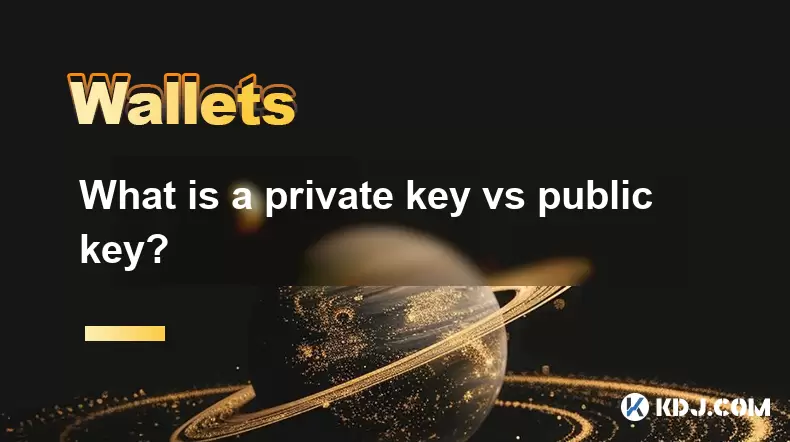
What is a private key vs public key?
Jul 01,2025 at 04:21am
Understanding the Basics of Cryptographic KeysIn the world of cryptocurrencies, the terms private key and public key are foundational. These keys form the backbone of blockchain security and ensure that digital assets remain protected while allowing for transparent transactions. At their core, these keys are part of a cryptographic system known as asymm...
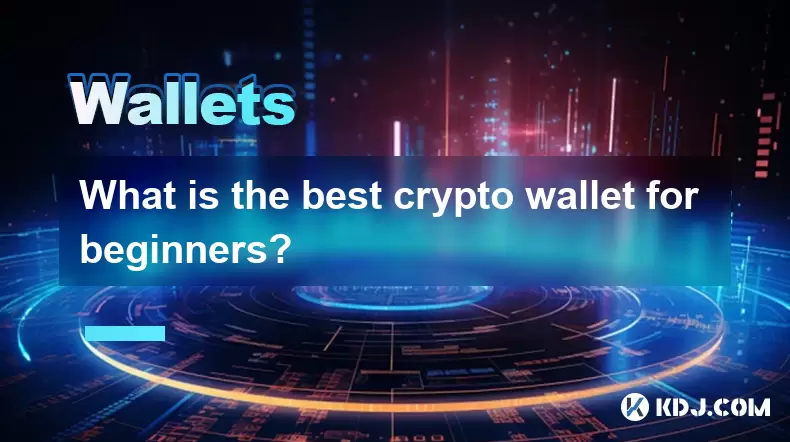
What is the best crypto wallet for beginners?
Jul 01,2025 at 02:42am
Understanding the Basics of Crypto WalletsA crypto wallet is a digital tool that allows users to store, send, and receive cryptocurrencies securely. Unlike traditional wallets that hold physical cash, crypto wallets do not actually store coins. Instead, they manage the private keys that grant access to blockchain addresses where your funds are recorded....
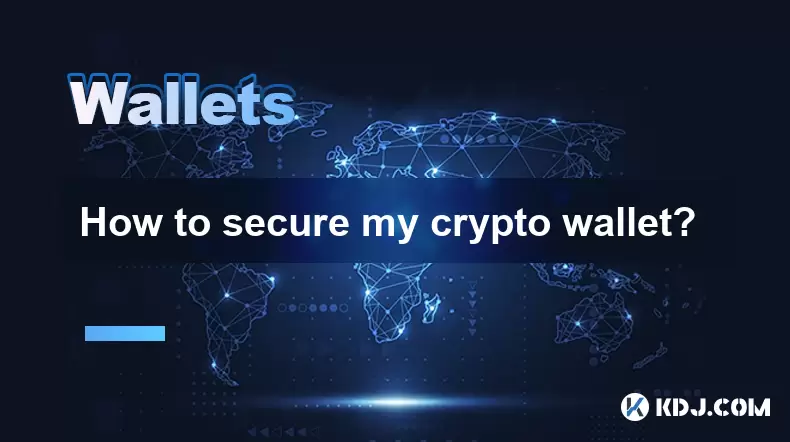
How to secure my crypto wallet?
Jul 01,2025 at 03:28am
Understanding the Importance of Crypto Wallet SecuritySecuring your crypto wallet is a fundamental aspect of managing digital assets. Unlike traditional bank accounts, cryptocurrency wallets do not have centralized institutions to reverse fraudulent transactions or recover lost funds. Therefore, security measures must be proactively managed by the user....
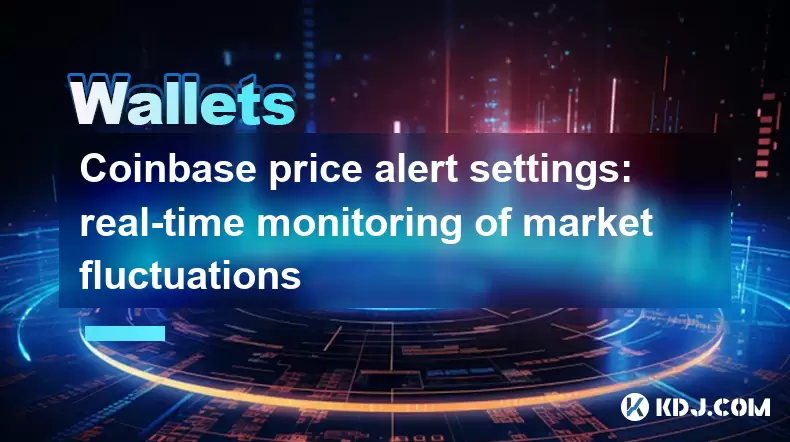
Coinbase price alert settings: real-time monitoring of market fluctuations
Jun 29,2025 at 07:00am
Setting Up Coinbase Price AlertsTo begin real-time monitoring of market fluctuations on Coinbase, users can utilize the built-in price alert feature. This function allows you to receive notifications when a cryptocurrency reaches a specific price point. To access this setting, open the Coinbase app or log in via the web platform. Navigate to the 'Prices...

How to stake cryptocurrencies on Coinbase? Benefits and risks
Jun 27,2025 at 06:36pm
Understanding Cryptocurrency Staking on CoinbaseStaking cryptocurrencies involves locking up digital assets to support the operations of a blockchain network, typically in return for rewards. Coinbase, one of the most popular cryptocurrency exchanges globally, offers staking services for several proof-of-stake (PoS) coins. Users can stake their holdings...

How to use MetaMask on mobile?
Jul 01,2025 at 06:00am
What is MetaMask and Why Use It on Mobile?MetaMask is one of the most widely used cryptocurrency wallets, offering users a secure way to interact with decentralized applications (dApps) on the Ethereum blockchain. While traditionally used as a browser extension on desktops, MetaMask also provides a mobile app, enabling seamless access to your crypto ass...

What is a private key vs public key?
Jul 01,2025 at 04:21am
Understanding the Basics of Cryptographic KeysIn the world of cryptocurrencies, the terms private key and public key are foundational. These keys form the backbone of blockchain security and ensure that digital assets remain protected while allowing for transparent transactions. At their core, these keys are part of a cryptographic system known as asymm...

What is the best crypto wallet for beginners?
Jul 01,2025 at 02:42am
Understanding the Basics of Crypto WalletsA crypto wallet is a digital tool that allows users to store, send, and receive cryptocurrencies securely. Unlike traditional wallets that hold physical cash, crypto wallets do not actually store coins. Instead, they manage the private keys that grant access to blockchain addresses where your funds are recorded....

How to secure my crypto wallet?
Jul 01,2025 at 03:28am
Understanding the Importance of Crypto Wallet SecuritySecuring your crypto wallet is a fundamental aspect of managing digital assets. Unlike traditional bank accounts, cryptocurrency wallets do not have centralized institutions to reverse fraudulent transactions or recover lost funds. Therefore, security measures must be proactively managed by the user....

Coinbase price alert settings: real-time monitoring of market fluctuations
Jun 29,2025 at 07:00am
Setting Up Coinbase Price AlertsTo begin real-time monitoring of market fluctuations on Coinbase, users can utilize the built-in price alert feature. This function allows you to receive notifications when a cryptocurrency reaches a specific price point. To access this setting, open the Coinbase app or log in via the web platform. Navigate to the 'Prices...

How to stake cryptocurrencies on Coinbase? Benefits and risks
Jun 27,2025 at 06:36pm
Understanding Cryptocurrency Staking on CoinbaseStaking cryptocurrencies involves locking up digital assets to support the operations of a blockchain network, typically in return for rewards. Coinbase, one of the most popular cryptocurrency exchanges globally, offers staking services for several proof-of-stake (PoS) coins. Users can stake their holdings...
See all articles

























































































